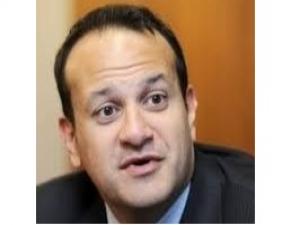
By Q Radio News
Leo Varadkar has warned a no-deal Brexit will not enable the UK to leapfrog unresolved issues to negotiate a free trade agreement with the EU.
The Taoiseach said in the wake of a no-deal, talks on a future trading relationship would still not begin until matters in the current withdrawal deal - such as citizens' rights, the financial settlement and the Irish border - were resolved.
On a visit to Northern Ireland, the Taoiseach said a no-deal was not inevitable and he was not being "fatalistic" about its likelihood.
But he said the risk of a disorderly exit was increasing as the clock ticked towards October 31.
After touring Hillsborough Castle in Co Down, the Queen's official residence in the region, Mr Varadkar said the Brexit process would not end on October 31, even if there is no deal.
"There are people who have perhaps become frustrated with the Brexit process and they are almost saying to themselves 'you know, at least if we have no deal on the 31st of October it's all over and it's all done'," he said.
"What I am saying is it doesn't end of the 31st of October, if we have no deal we are going to have to talk and the first things on the agenda are going to be citizens' rights, the financial settlement and the solution to the Irish border, before we even start to talk about a free trade agreement."
He added: "If there is a deal, we are going to enter into several years of negotiations on a new free trade agreement with the UK and a new economic and security partnership."
Mr Varadkar continued: "So, Brexit isn't a storm that we weather or a severe weather event that we prepare for, it is a permanent change in relations between the European Union, including Ireland, and the United Kingdom. I think that needs to be borne in mind."
The Taoiseach reiterated the EU position that the Withdrawal Agreement was not open for renegotiation.
But the Irish premier insisted there was scope to offer clarifications on the deal and make changes to the Political Declaration on the future relationship.
"I don't accept it's unavoidable," he said of the prospects of a no-deal.
"There are many ways by which a no-deal can be avoided. Either by the ratification of the Withdrawal Agreement, a further extension or revocation of Article 50.
"So, there are a number of ways that a no-deal can be avoided on the 31st of October. I am certainly not fatalistic about that."
Mr Varadkar said there was a lot of "historical revisionism" on the origins of the contentious border backstop, with claims it was an Irish and EU invention "imposed" on the UK.
"That is so not the case," he said. "The backstop and the Withdrawal Agreement were co-designed by the UK Government and the EU.
"They were drawn very much around red lines drawn by the UK Government and that is how we got to this point, and if we are going to start from scratch I think it would take a long time for us to come to an agreement on that basis."
Asked he was frustrated at the claimed revisionism, he replied: "Not at all, but I am surprised it isn't going challenged a bit more."
Mr Varadkar said he had last week invited Prime Minister Boris Johnson to hold talks with him in Dublin on Brexit and other issues with "no preconditions".
"I certainly stand over that invite," he said.
The Taoiseach said Ireland was still in discussions with the European Commission on what form customs and regulatory checks would take in the event of a no-deal.
"We are going to tell people - citizens and businesses - when we know," he said.
The Irish premier said the likelihood of a no-deal increased as the clock counted down to the end of October.
"As time goes on, yes a no-deal becomes more likely, that's why we have been preparing for it even from before the referendum took place," he said.
Mr Varadkar acknowledged that relations with the UK Government had been under strain, but he said that did not mean a Brexit deal was impossible.
"As is often the case before an agreement, things can be a little bit difficult but they end with an agreement, and I think that's possible," he said.
Relations between the Irish Government and the Democratic Unionist Party have also frayed during the Brexit process.
DUP MP Jeffrey Donaldson greeted Mr Varadkar on Tuesday as he arrived at the historic royal palace in Co Down.
The Taoiseach said he was always willing to engage with the DUP.
"It's always good to have lines to communication open and while it may not always appear so, lines of communication are very much open," he said.
Lagan Valley MP Mr Donaldson welcomed the Taoiseach's visit to his constituency, predicting it would deliver a tourism boost for the recently renovated Hillsborough Castle.
"We remain hopeful we can find a way through the current impasse over Brexit and get an outcome that works for both Northern Ireland and the Republic," he added.
"At the end of the day we have got to move beyond the megaphone diplomacy and we have got to engage and that's important, and we wish no ill will in terms of the personality side towards anyone in the Irish government.
"At the end of the day when hopefully Stormont is back up and running, we have to work with our counterparts in the Irish government on the north-south issues, so it's important to maintain relationships."


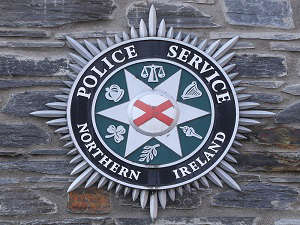 Teenage girl killed in road crash named as Kamile Vaicikonyte
Teenage girl killed in road crash named as Kamile Vaicikonyte
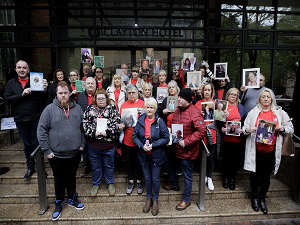 Covid-19 inquiry ‘an opportunity for candour’ from Stormont leaders
Covid-19 inquiry ‘an opportunity for candour’ from Stormont leaders
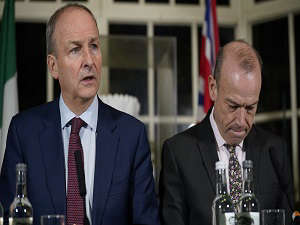 UK and Irish ministers to meet amid row over migration
UK and Irish ministers to meet amid row over migration
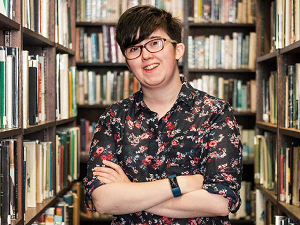 Three men set to go on trial for murder of journalist Lyra McKee
Three men set to go on trial for murder of journalist Lyra McKee
 Swann refuses to rule out resigning if budget is not changed
Swann refuses to rule out resigning if budget is not changed